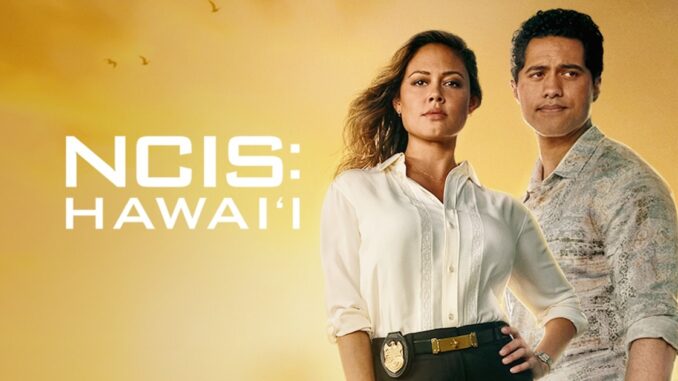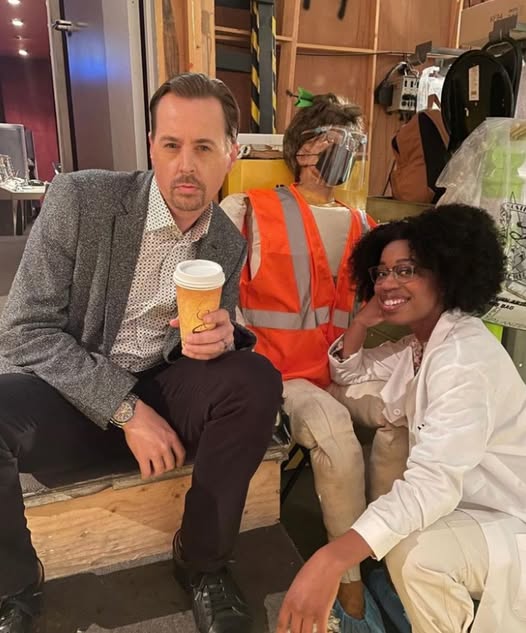
If ever a TV show felt like it came out of a focus group, it’s CBS’s latest “NCIS” spinoff. That’s not inherently a bad thing, but when you look at “NCIS: Hawaii” (Monday, 10 EDT/PDT, ★★½ out of four), it’s hard not to think someone down at ViacomCBS corporate headquarters thought, “Hey! What if we combined ‘NCIS’ and ‘Hawaii Five-0’!”
What if, indeed. The latest series in the mega-popular “NCIS” franchise, which includes the original, “LA” and the recently canceled “New Orleans,” recycles familiar parts of the Naval investigative formula against the starkly gorgeous backdrop of Pearl Harbor, Hawaii. Although the one major change here is that instead of a Mark Harmon-type baby boomer hunk at the center like in the original and “New Orleans” (or a Chris O’Donnell-type Gen X hunk, like in “LA”), “Hawaii” is anchored by Vanessa Lachey, a younger woman of color. It also includes LGBTQ characters in the ensemble cast.
It’s a modicum of a new direction for “NCIS,” one that might alienate some fans but also bring new ones to the franchise that has a reputation for being enjoyed by very old (and old-fashioned) viewers. But overall, “Hawaii” doesn’t change much about the core structure of “NCIS,” in which agents investigate crimes involving members of the U.S. Navy, this time in Hawaii. The first episode of the new series had all the trappings of a typical “NCIS” affair: Dramatic crime, joking NCIS agents, connections to international espionage, patriotism, an action set-piece and a predictable ending.
As an extension of the popular procedural, “Hawaii” is a perfectly serviceable series. Lachey plays the leader of our new group, Special Agent in Charge Jane Tennant, a soccer mom and a tough-as-nails agent. Her team includes newbie Kai (Alex Tarrant), a native Hawaiian who reluctantly returned home because of his father’s health; Lucy (Yasmine Al-Bustami), a rule breaker dealing with romance complications; tech expert Ernie (Jason Antoon); and second-in-command Jesse (Noah Mills), who has few defining traits (so far). Also occasionally involved is CIA agent Kate (Tori Anderson), a sometimes foe of her NCIS colleagues.
Aloha to a New Chapter in the NCIS Universe
The “NCIS” franchise has been a television titan for over two decades. It’s delivered thrills, sharp investigations, and characters that fans feel like they know personally. So when “NCIS: Hawaii” hit the screen, expectations were high. Would it be a refreshing island breeze—or just a rerun with palm trees?
Well, the answer is both.
The Balancing Act: Same Formula, New Island Vibes
Familiar Procedural DNA
Let’s be real—fans tune into NCIS shows for that reliable formula. You’ve got your crime, quirky team dynamics, military ties, and of course, a weekly case wrapped up with a bow. “NCIS: Hawaii” sticks closely to that format.
But here’s the twist—it tries to layer local culture, landscapes, and themes of identity into the mix. It wants to honor Hawaii’s spirit without drifting too far from what makes the franchise tick.
Unique Setting, Classic Structure
The lush beaches, island customs, and Pacific politics offer a compelling canvas. However, beneath the palm trees, you’re still watching a structured federal investigation show with a predictable rhythm. That’s not bad—it just means you’re not breaking new ground, but maybe you’re walking the same path in flip-flops.
Jane Tennant: A Leading Lady With A Mission
First Female Lead in NCIS History
Vanessa Lachey’s Jane Tennant made headlines as the first female lead in the NCIS universe. That alone is a game-changer. She’s strong, compassionate, and sharp—but not immune to flaws. Her struggles juggling motherhood with her job as Special Agent-in-Charge add a rich layer to her character.
Strong, But Sometimes Too Safe
Still, while Tennant breaks some ground, she’s often written too “safe”—less edgy than Gibbs, less mysterious than Pride. There’s room for her to evolve beyond a checklist of empowerment traits.
Diversity That Reflects the Real Hawaii
Casting That Celebrates Culture
One of the spinoff’s strongest points is its diverse and culturally accurate cast. You’ll see native Hawaiian actors, Pacific Islanders, and Asian American performers in prominent roles.
Cultural Nuances That Feel Real (Most of the Time)
From local cuisine to community dynamics, the show tries to highlight authentic Hawaiian life. Occasionally, though, it skims the surface instead of diving deep—offering a postcard rather than a portrait.
The Team: Quirky, Capable, but Not Quite There Yet
Kai Holman – The Local With Layers
Played by Alex Tarrant, Kai’s return to the island mirrors many real-world stories of diaspora and identity. His inner conflict is a strength—but sometimes, his backstory feels like it’s used more as a plot device than real development.
Lucy Tara & Kate Whistler – A Queer Relationship That Breaks Ground
These two characters mark a milestone with one of the franchise’s first queer romantic relationships. Their chemistry is undeniable, but the writing occasionally shies away from giving their storylines the same depth as straight couples.
Ernie Malik – The Comic Relief with a Brain
Ernie, the cybersecurity whiz, is endearing but sometimes veers too far into tech-geek stereotypes. Let’s give this guy a more nuanced arc, shall we?
Where It Hits the Mark
Representation Done (Mostly) Right
For a procedural, NCIS: Hawaii makes a real effort to reflect the island’s diverse cultural landscape, something many network shows gloss over.
Gorgeous Scenery & Authentic Locations
The show doesn’t just talk about Hawaii—it lives there. The cinematography alone can make you want to pack your bags.
Moments of True Emotional Depth
When the series slows down and leans into personal storytelling—grief, identity, justice—it shines.
Where It Misses the Mark
Playing It Too Safe
Trying to stay in the NCIS lane means the show often pulls punches. It rarely takes narrative risks, even when it’s well-positioned to.
Clichés Creep In
The “local vs. mainlander” tropes, the rebellious kid subplot, the “overprotective mom” arc—we’ve seen them before, and we’ll likely see them again.
Surface-Level Culture Moments
There’s an occasional vibe of cultural tourism rather than deep integration, which might leave some viewers craving more authenticity.
How It Compares to Other NCIS Shows
NCIS: Los Angeles vs. Hawaii
LA leaned heavily into action and tech. Hawaii is more about relationships and identity. It’s slower—but perhaps more meaningful.
🇺🇸 OG NCIS vs. Hawaii
Gibbs was a stoic moral compass; Tennant is more openly emotional. The Hawaii team feels less mysterious, more family-like.

Is NCIS: Hawaii the Future of the Franchise?
It’s not a complete reinvention, but it’s a step in the right direction. With a few bold moves—stronger arcs, deeper cultural ties, and sharper stakes—NCIS: Hawaii could set a new standard. Right now, it’s walking a tightrope between innovation and imitation.
Conclusion: Familiar Shores With New Waves
“NCIS: Hawaii” isn’t perfect, but it’s trying to do something meaningful. It doesn’t stray far from the franchise’s formula—but it adds new flavors, faces, and themes. It’s a show that dares to be different, but never too different. If the creators lean further into what makes it unique, it might just become more than a spin-off—it could be the next big chapter.